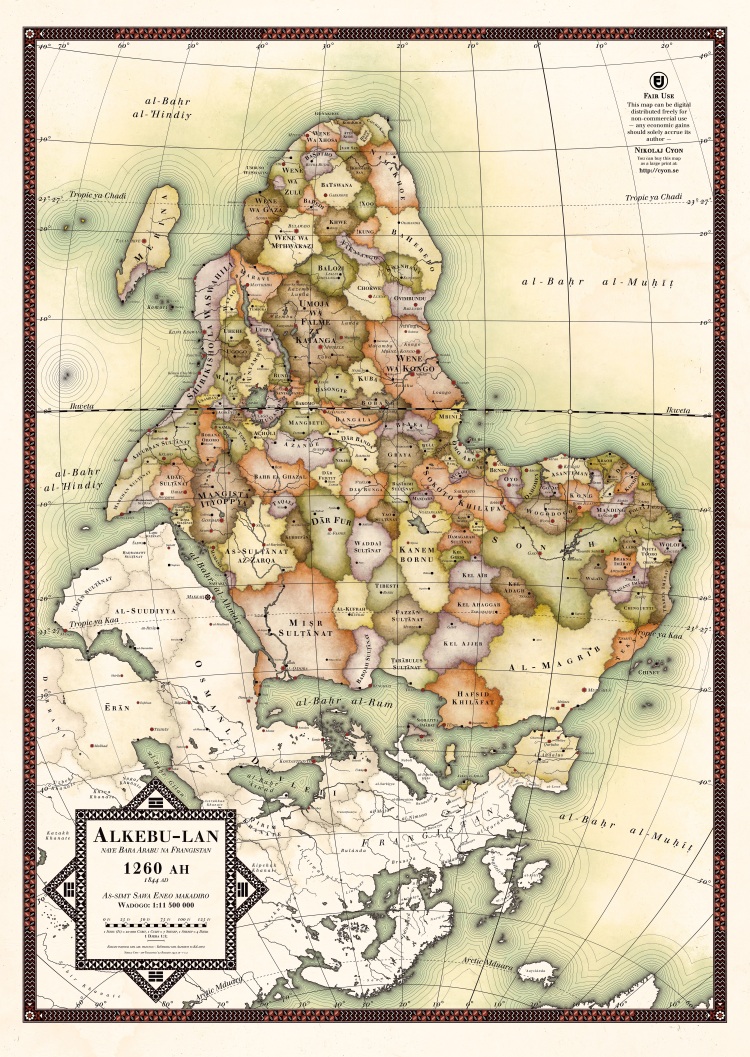
King Zangar Kadesi– The successor of King Sar, who ran his capital from Little Bassa, near Edina Grand Bassa. One of the greatest allies to the early colony, Kadesi saved Edina from attack on June 10th, 1835 forces were stopped by Kadesi Warriors Kadesi also aided the Bassa Cove colony in erraticating the slave trade. Kadesi was succeeded by popular Bassa chief Bob Gray.
Queen Famata Bendu Sandamani– They called her Sandemani, Queen Famata Bendu, a name that echoed with the power of the Sande society itself. But royalty wasn’t handed to her, no sir! She earned it. They called her “Taradogba” too, meaning “grave” in the Gola tongue, a reminder that she wasn’t no giggling flower.
Famata Bendu, wife of King Arma, the favorite one, mind you. But fate, that jester with a cruel streak, snatched her king on the battlefield. Some might crumble, weep into their robes. But Famata Bendu? She straightened her back, fire in her eyes. They say she took that Gawula throne, claimed it as hers by right, became ruler of the Vai people herself!
But a queen don’t rule alone! Famata Bendu, wise as she was strong, took King Al Haj, or Lahai of the Gallinas, as her husband. Together they brought forth Momolu Massaquoi, a leader in his own right. This sister wouldn’t be messed with!
But even the bravest warriors face setbacks. The Sofa warriors came, a storm of violence that swept through Vai lands. Famata Bendu, though she wouldn’t yield, wouldn’t bow, was forced to flee. And in 1891, that warrior queen, that leader, that woman who defied the odds, drew her last breath.
Chief Yellow Will–
Momolu Sao– Momolu Sao, a name whispered through the Liberian winds, a man whose power echoed from Bopolu to the farthest reaches of western Liberia. Son of Sao Boso, he wasn’t content to follow in his father’s footsteps. Instead, he carved his own path, establishing the town of Totokwele, a testament to his ambition and leadership.
Blood ties bound him to Fan Kwekwe, their mothers sharing the rich heritage of the Gola people. But Momolu Sao wasn’t just defined by lineage. He was a force in his own right. From the early 1860s until his final breath, his influence held sway over a vast swathe of western Liberia.
Even the pioneering spirits who ventured into the unknown, like Benjamin J.K. Anderson and Edward Wilmot Blyden, crossed paths with Momolu Sao. He wasn’t just a ruler, he was a landmark, a figure etched into the Liberian story. History offers little detail about his reign, but his legacy speaks volumes. He was a leader, an innovator, a man who carved his own destiny in the heart of Liberia.
King Sao Boso–
Simlah Ballah– also known as (Bill Williams), a Grebo man with the powerful name of Ballah, wasn’t your average tribesman. He carried the weight of two worlds on his shoulders. A member of the Nyomowe section, he spoke the colonizer’s tongue with the fluency of a native. This gift made him King Freeman’s voice, a bridge between the established Grebo people and the encroaching Maryland State Colonization Society.
Ballah wasn’t confined to Cape Palmas. He walked the coastal path, a living map, and by the early 1830s, his presence was known even in Monrovia. But his true test came in 1836. Dr. James Hall, the Society’s agent, arrived with whispers of a new settlement. Ballah, ever the diplomat, crossed the ocean with Hall, his voice carrying King Freeman’s message – a message of cautious acceptance for these new arrivals.
Back in Baltimore, Ballah stood before the Society’s board, a man of two cultures advocating for a fragile peace. He wasn’t just a translator, he was a negotiator, paving the way for more settlers with the blessing (if not the full enthusiasm) of the Cape Palmas leadership.
But Ballah’s role didn’t end there. He became the conduit, carrying back the Society’s “Code of Laws,” a document that would reshape the landscape of Cape Palmas. He ensured understanding, navigated the inevitable friction that arose between the established Grebo community and the newcomers.
Fate, however, dealt a harsh hand. In 1860, Yellow Will, the Grebo chief, passed away. Ballah ascended, but his leadership was a double-edged sword. The Grebo people, his own kin, harbored resentment, while the settlers remained wary. This weight of expectation, this struggle to bridge two divergent worlds, must have been a heavy burden to bear.
Ballah’s reign ended in 1865, his life a testament to the complexities of cultural exchange. He wasn’t a king, nor a colonizer, but a man caught in the in-between, a necessary bridge in a time of flux.
Peter Zulu Duma–
N’Damba– N’Damba, a woman of the Kissi people from Liberia’s northwestern frontier. History whispers her name, but offers little else. Yet, her legacy is tragically intertwined with the soul-crushing trade of human chattel.
Her son, James Cleveland, a product of a union between N’Damba and an English merchant, became a symbol of the corrupting influence of colonialism. He straddled two worlds, wielding his African and European heritage not for unity, but for exploitation.
Cleveland rose to notoriety as a ruthless Westernized slaver, preying on the very people he called kin. He and his “allies” across the sea orchestrated the brutal export of West Africans to the Americas, their greed fueled by a warped sense of progress.
N’Damba, the forgotten mother, stands as a stark reminder of the insidious nature of colonialism. It wasn’t just about stolen resources and subjugated lands; it fractured families and twisted identities. James Cleveland, a man consumed by avarice, became a tool of this oppression, forever staining his mother’s legacy with the blood of his people.






